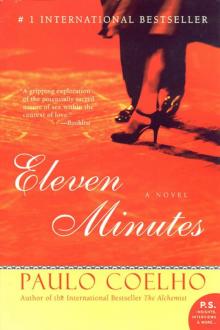- Home
- Paulo Coelho
Inspirations Page 8
Inspirations Read online
Page 8
A week later, I am transferred here. Three more months go over and my mother dies. No one knew better than you how deeply I loved and honoured her. Her death was terrible to me; but I, once a lord of language, have no words in which to express my anguish and my shame. Never even in the most perfect days of my development as an artist could I have found words fit to bear so august a burden; or to move with sufficient stateliness of music through the purple pageant of my incommunicable woe. She and my father had bequeathed me a name they had made noble and honoured, not merely in literature, art, archaeology, and science, but in the public history of my own country, in its evolution as a nation. I had disgraced that name eternally. I had made it a low byword among low people. I had dragged it through the very mire. I had given it to brutes that they might make it brutal, and to fools that they might turn it into a synonym for folly. What I suffered then, and still suffer, is not for pen to write or paper to record. My wife, always kind and gentle to me, rather than that I should hear the news from indifferent lips, travelled, ill as she was, all the way from Genoa to England to break to me herself the tidings of so irreparable, so irredeemable, a loss. Messages of sympathy reached me from all who had still affection for me. Even people who had not known me personally, hearing that a new sorrow had broken into my life, wrote to ask that some expression of their condolence should be conveyed to me…
Three months go over. The calendar of my daily conduct and labour that hangs on the outside of my cell door, with my name and sentence written upon it, tells me that it is May.
My friends come to see me again. I enquire, as I always do, after you. I am told that you are in your villa at Naples, and are bringing out a volume of poems. At the close of the interview it is mentioned casually that you are dedicating them to me. The tidings seemed to give me a sort of nausea of life. I said nothing, but silently went back to my cell with contempt and scorn in my heart. How could you dream of dedicating a volume of poems to me without first asking my permission? Dream, do I say? How could you dare do such a thing? Will you give as your answer that in the days of my greatness and fame I had consented to receive the dedication of your early work? Certainly I did so: just as I would have accepted the homage of any other young men beginning the difficult and beautiful art of literature. All homage is delightful to an artist and doubly sweet when youth brings it. Laurel and bay leaf wither when aged hands pluck them. Only youth has a right to crown an artist. That is the real privilege of being young if youth only knew it. But the days of abasement and infamy are different from those of greatness and fame. You had yet to learn that.
Prosperity, pleasure and success, may be rough of grain and common in fibre, but sorrow is the most sensitive of all created things. There is nothing that stirs in the whole world of thought to which sorrow does not vibrate in terrible and exquisite pulsation. The thin beaten-out leaf of tremulous gold that chronicles the direction of forces the eye cannot see is in comparison coarse. It is a wound that bleeds when any hand but that of love touches it, and even then must bleed again, though not in pain.
You could write to the Governor of Wandsworth Prison to ask my permission to publish my letters in the Mercure de France, ‘corresponding to our English Fortnightly Review’. Why not have written to the Governor of the Prison at Reading to ask my permission to dedicate your poems to me, whatever fantastic description you may have chosen to give them? Was it because in the one case the magazine in question had been prohibited by me from publishing letters, the legal copyright of which, as you are, of course, perfectly well aware, was and is vested entirely in me, and in the other you thought that you could enjoy the wilfulness of your own way without my knowing anything about it till it was too late to interfere? The mere fact that I was a man disgraced, ruined and in prison should have made you, if you desired to write my name on the fore-page of your work, beg it of me as a favour, an honour, a privilege: that is the way in which one should approach those who are in distress and sit in shame.
Where there is sorrow there is holy ground. Some day people will realize what that means. They will know nothing of life till they do. Robbie and natures like his can realize it. When I was brought down from my prison to the Court of Bankruptcy, between two policemen, Robbie waited in the long dreary corridor that, before the whole crowd, whom an action so sweet and simple hushed into silence, he might gravely raise his hat to me, as, handcuffed and with bowed head, I passed him by. Men have gone to heaven for smaller things than that. It was in this spirit, and with this mode of love, that the saints knelt down to wash the feet of the poor, or stooped to kiss the leper on the cheek. I have never said one single word to him about what he did. I do not know to the present moment whether he is aware that I was even conscious of his action. It is not a thing for which one can render formal thanks in formal words. I store it in the treasure-house of my heart. I keep it there as a secret debt that I am glad to think I can never possibly repay. It is embalmed and kept sweet by the myrrh and cassia of many tears. When wisdom has been profitless to me, philosophy barren, and the proverbs and phrases of those who have sought to give me consolation as dust and ashes in my mouth, the memory of that little, lovely, silent act of love has unsealed for me all the wells of pity: made the desert blossom like a rose, and brought me out of the bitterness of lonely exile into harmony with the wounded, broken, and great heart of the world. When people are able to understand, not merely how beautiful Robbie’s action was, but why it meant so much to me, and always will mean so much, then, perhaps, they will realize how and in what spirit they should approach me…
BRAM STOKER
from Dracula
Dr Seward’s Diary
5 June – The case of Renfield grows more interesting the more I get to understand the man. He has certain qualities very largely developed: selfishness, secrecy and purpose. I wish I could get at what is the object of the latter. He seems to have some settled scheme of his own, but what it is I do not yet know. His redeeming quality is a love of animals, though, indeed, he has such curious turns in it that I sometimes imagine he is only abnormally cruel. His pets are of odd sorts. Just now his hobby is catching flies. He has at present such a quantity that I have had myself to expostulate. To my astonishment, he did not break out into a fury, as I expected, but took the matter in simple seriousness. He thought for a moment, and then said: ‘May I have three days? I shall clear them away.’ Of course, I said that would do. I must watch him.
18 June – He has turned his mind now to spiders, and has got several very big fellows in a box. He keeps feeding them with his flies, and the number of the latter is becoming sensibly diminished, although he has used half his food in attracting more flies from outside to his room.
1 July – His spiders are now becoming as great a nuisance as his flies, and today I told him that he must get rid of them. He looked very sad at this, so I said that he must clear out some of them, at all events. He cheerfully acquiesced in this, and I gave him the same time as before for reduction. He disgusted me much while with him, for when a horrid blow-fly, bloated with some carrion food, buzzed into the room, he caught it, held it exultingly for a few moments between his finger and thumb, and, before I knew what he was going to do, put it in his mouth and ate it. I scolded him for it, but he argued quietly that it was very good and very wholesome; that it was life, strong life, and gave life to him. This gave me an idea; or the rudiment of one. I must watch how he gets rid of his spiders. He has evidently some deep problem in his mind, for he keeps a little notebook in which he is always jotting down something. Whole pages of it are filled with masses of figures, generally single numbers added up in batches, and then the totals added in batches again, as though he were ‘focusing’ some account, as the auditors put it.
8 July – There is a method in his madness, and the rudimentary idea in my mind is growing. It will be a whole idea soon, and then, oh, unconscious cerebration! you will have to give the wall to your conscious brother. I kept away from my friend for a few da
ys, so that I might notice if there were any change. Things remain as they were except that he has parted with some of his pets and got a new one. He has managed to get a sparrow, and has already partially tamed it. His means of taming is simple, for already the spiders have diminished. Those that do remain, however, are well fed, for he still brings in the flies by tempting them with his food.
19 July – We are progressing. My friend has now a whole colony of sparrows, and his flies and spiders are almost obliterated. When I came in he ran to me and said he wanted to ask me a great favour – a very, very great favour; and as he spoke he fawned on me like a dog. I asked him what it was, and he said, with a sort of rapture in his voice and bearing:
‘A kitten, a nice little, sleek, playful kitten, that I can play with, and teach, and feed – and feed – and feed!’ I was not unprepared for this request, for I had noticed how his pets went on increasing in size and vivacity, but I did not care that his pretty family of tame sparrows should be wiped out in the same manner as the flies and the spiders; so I said I would see about it, and asked him if he would not rather have a cat than a kitten. His eagerness betrayed him as he answered:
‘Oh yes, I would like a cat! I only asked for a kitten lest you should refuse me a cat. No one would refuse me a kitten, would they?’ I shook my head, and said that at present I feared it would not be possible, but that I would see about it. His face fell, and I could see a warning of danger in it, for there was a sudden fierce, sidelong look which meant killing. The man is an undeveloped homicidal maniac. I shall test him with his present craving and see how it will work out; then I shall know more.
10 p.m. – I have visited him again and found him sitting in a corner brooding. When I came in he threw himself on his knees before me and implored me to let him have a cat; that his salvation depended upon it. I was firm, however, and told him that he could not have it, whereupon he went without a word, and sat down, gnawing his fingers, in the corner where I had found him. I shall see him in the morning early.
20 July – Visited Renfield very early, before the attendant went his rounds. Found him up and humming a tune. He was spreading out his sugar, which he had saved, in the window, and was manifestly beginning his fly-catching again; and beginning it cheerfully and with a good grace. I looked around for his birds, and not seeing them, asked him where they were. He replied, without turning round, that they had all flown away. There were a few feathers about the room and on his pillow a drop of blood. I said nothing, but went and told the keeper to report to me if there were anything odd about him during the day.
11 a.m. – The attendant has just been to me to say that Renfield has been very sick and has disgorged a whole lot of feathers. ‘My belief is, doctor,’ he said, ‘that he has eaten his birds, and that he just took and ate them raw!’
11 p.m. – I gave Renfield a strong opiate tonight, enough to make even him sleep, and took away his pocket-book to look at it. The thought that has been buzzing about my brain lately is complete, and the theory proved. My homicidal maniac is of a peculiar kind. I shall have to invent a new classification for him, and call him a zoophagous (life-eating) maniac; what he desires is to absorb as many lives as he can, and he has laid himself out to achieve it in a cumulative way. He gave many flies to one spider and many spiders to one bird, and then wanted a cat to eat the many birds. What would have been his later steps? It would almost be worth while to complete the experiment. It might be done if there were only a sufficient cause. Men sneered at vivisection, and yet look at its results today! Why not advance science in its most difficult and vital aspect – the knowledge of the brain? Had I even the secret of one such mind – did I hold the key to the fancy of even one lunatic – I might advance my own branch of science to a pitch compared with which Burdon-Sanderson’s physiology or Ferrier’s brain-knowledge would be as nothing. If only there were a sufficient cause! I must not think too much of this, or I may be tempted; a good cause might turn the scale with me, for may not I too be of an exceptional brain, congenitally?
How well the man reasoned; lunatics always do within their own scope. I wonder at how many lives he values a man, or if at only one. He has closed the account most accurately, and today begun a new record. How many of us begin a new record with each day of our lives?
To me it seems only yesterday that my whole life ended with my new hope, and that truly I began a new record. So it will be until the Great Recorder sums me up and closes my ledger account with a balance to profit or loss. Oh, Lucy, Lucy, I cannot be angry with you, nor can I be angry with my friend whose happiness is yours; but I must only wait on hopeless and work. Work! work!
If I only could have as strong a cause as my poor mad friend there, a good, unselfish cause to make me work, that would be indeed happiness.
HANNAH ARENDT
from Eichmann and the Holocaust
What eventually led to his capture was his compulsion to talk big – he was ‘fed up with being an anonymous wanderer between the worlds’ – and this compulsion must have grown considerably stronger as time passed, not only because he had nothing to do that he could consider worth doing, but also because the postwar era had bestowed so much unexpected ‘fame’ upon him.
But bragging is a common vice, and a more specific, and also more decisive, flaw in Eichmann’s character was his almost total inability ever to look at anything from the other fellow’s point of view. Nowhere was this flaw more conspicuous than in his account of the Vienna episode. He and his men and the Jews were all ‘pulling together’, and whenever there were any difficulties the Jewish functionaries would come running to him ‘to unburden their hearts’, to tell him ‘all their grief and sorrow’, and to ask for his help. The Jews ‘desired’ to emigrate, and he, Eichmann, was there to help them, because it so happened that at the same time the Nazi authorities had expressed a desire to see their Reich judenrein. The two desires coincided, and he, Eichmann, could ‘do justice to both parties’. At the trial, he never gave an inch when it came to this part of the story, although he agreed that today, when ‘times have changed so much’, the Jews might not be too happy to recall this ‘pulling together’ and he did not want ‘to hurt their feelings’.
The German text of the taped police examination, conducted from 29 May 1960 to 17 January 1961, each page corrected and approved by Eichmann, constitutes a veritable gold mine for a psychologist – provided he is wise enough to understand that the horrible can be not only ludicrous but outright funny. Some of the comedy cannot be conveyed in English, because it lies in Eichmann’s heroic fight with the German language, which invariably defeats him. It is funny when he speaks, passim, of ‘winged words’ (geflügelte Worte, a German colloquialism for famous quotes from the classics) when he means stock phrases, Redensarten, or slogans, Schlagworte. It was funny when, during the cross-examination on the Sassen documents, conducted in German by the presiding judge, he used the phrase ‘kontra geben’ (to give tit for tat), to indicate that he had resisted Sassen’s efforts to liven up his stories; Judge Landau, obviously ignorant of the mysteries of card games, did not understand, and Eichmann could not think of any other way to put it. Dimly aware of a defect that must have plagued him even in school – it amounted to a mild case of aphasia – he apologized, saying, ‘Officialese [Amtssprache] is my only language.’ But the point here is that officialese became his language because he was genuinely incapable of uttering a single sentence that was not a cliché. (Was it these clichés that the psychiatrists thought so ‘normal’ and ‘desirable’? Are these the ‘positive ideas’ a clergyman hopes for in those to whose souls he ministers? Eichmann’s best opportunity to show this positive side of his character in Jerusalem came when the young police officer in charge of his mental and psychological well-being handed him Lolita for relaxation. After two days Eichmann returned it, visibly indignant; ‘Quite an unwholesome book’ – ‘Das ist aber ein sehr unerfreuliches Buch’ – he told his guard.) To be sure, the judges were right when they finally told
the accused that all he had said was ‘empty talk’ – except that they thought the emptiness was feigned, and that the accused wished to cover up other thoughts which, though hideous, were not empty. This supposition seems refuted by the striking consistency with which Eichmann, despite his rather bad memory, repeated word for word the same stock phrases and self-invented clichés (when he did succeed in constructing a sentence of his own, he repeated it until it became a cliché) each time he referred to an incident or event of importance to him. Whether writing his memoirs in Argentina or in Jerusalem, whether speaking to the police examiner or to the court, what he said was always the same, expressed in the same words. The longer one listened to him, the more obvious it became that his inability to speak was closely connected with an inability to think, namely, to think from the standpoint of somebody else. No communication was possible with him, not because he lied but because he was surrounded by the most reliable of all safeguards against the words and the presence of others, and hence against reality as such.
Thus, confronted for eight months with the reality of being examined by a Jewish policeman, Eichmann did not have the slightest hesitation in explaining to him at considerable length, and repeatedly, why he had been unable to attain a higher grade in the SS, and that this was not his fault. He had done everything, even asked to be sent to active military duty – ‘Off to the front, I said to myself, then the Standartenführer [colonelcy] will come quicker.’ In court, on the contrary, he pretended he had asked to be transferred because he wanted to escape his murderous duties. He did not insist much on this, though, and, strangely, he was not confronted with his utterances to Captain Less, whom he also told that he had hoped to be nominated for the Einsatzgruppen, the mobile killing units in the East, because when they were formed, in March 1941, his office was ‘dead’ – there was no emigration any longer and deportations had not yet been started. There was, finally, his greatest ambition – to be promoted to the job of police chief in some German town; again, nothing doing. What makes these pages of the examination so funny is that all this was told in the tone of someone who was sure of finding ‘normal, human’ sympathy for a hard-luck story. ‘Whatever I prepared and planned, everything went wrong, my personal affairs as well as my years-long efforts to obtain land and soil for the Jews. I don’t know, everything was as if under an evil spell; whatever I desired and wanted and planned to do, fate prevented it somehow. I was frustrated in everything, no matter what.’ When Captain Less asked his opinion on some damning and possibly lying evidence given by a former colonel of the SS, he exclaimed, suddenly stuttering with rage: ‘I am very much surprised that this man could ever have been an SS Standartenführer, that surprises me very much indeed. It is altogether, altogether unthinkable. I don’t know what to say.’ He never said these things in a spirit of defiance, as though he wanted, even now, to defend the standards by which he had lived in the past. The very words ‘SS’, or ‘career’, or ‘Himmler’ (whom he always called by his long official title: Reichsführer SS and Chief of the German Police, although he by no means admired him) triggered in him a mechanism that had become completely unalterable. The presence of Captain Less, a Jew from Germany and unlikely in any case to think that members of the SS advanced in their careers through the exercise of high moral qualities, did not for a moment throw this mechanism out of gear.

 The Alchemist
The Alchemist Maktub
Maktub Like the Flowing River
Like the Flowing River The Winner Stands Alone
The Winner Stands Alone The Spy
The Spy By the River Piedra I Sat Down and Wept: A Novel of Forgiveness
By the River Piedra I Sat Down and Wept: A Novel of Forgiveness Eleven Minutes
Eleven Minutes Manuscript Found in Accra
Manuscript Found in Accra Warrior of the Light
Warrior of the Light Veronika Decides to Die: A Novel of Redemption
Veronika Decides to Die: A Novel of Redemption The Devil and Miss Prym: A Novel of Temptation
The Devil and Miss Prym: A Novel of Temptation The Valkyries: An Encounter With Angels
The Valkyries: An Encounter With Angels Brida: A Novel
Brida: A Novel Fifth Mountain: A Novel
Fifth Mountain: A Novel Adultery
Adultery Inspirations
Inspirations The Archer
The Archer The Witch of Portobello
The Witch of Portobello The Pilgrimage
The Pilgrimage The Zahir
The Zahir Brida
Brida The Fifth Mountain
The Fifth Mountain Like the Flowing River: Thoughts and Reflections
Like the Flowing River: Thoughts and Reflections Manual of the Warrior of Light
Manual of the Warrior of Light By The River Piedra I Sat Down & Wept
By The River Piedra I Sat Down & Wept The Supreme Gift
The Supreme Gift Aleph
Aleph Hippie
Hippie Witch of Portobello
Witch of Portobello The Devil and Miss Prym
The Devil and Miss Prym The Alchemist - 10th Anniversary Edition
The Alchemist - 10th Anniversary Edition The Valkyries
The Valkyries